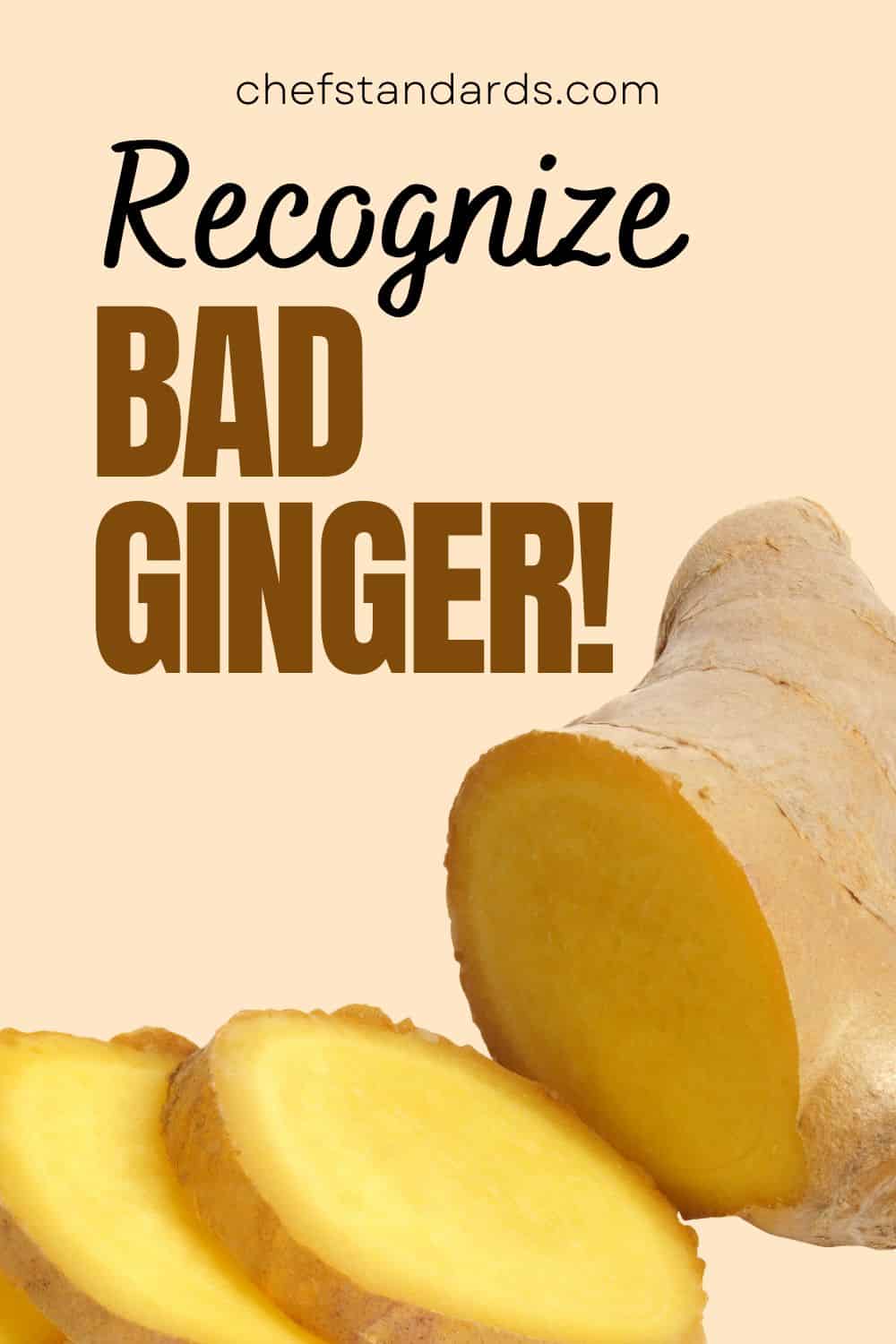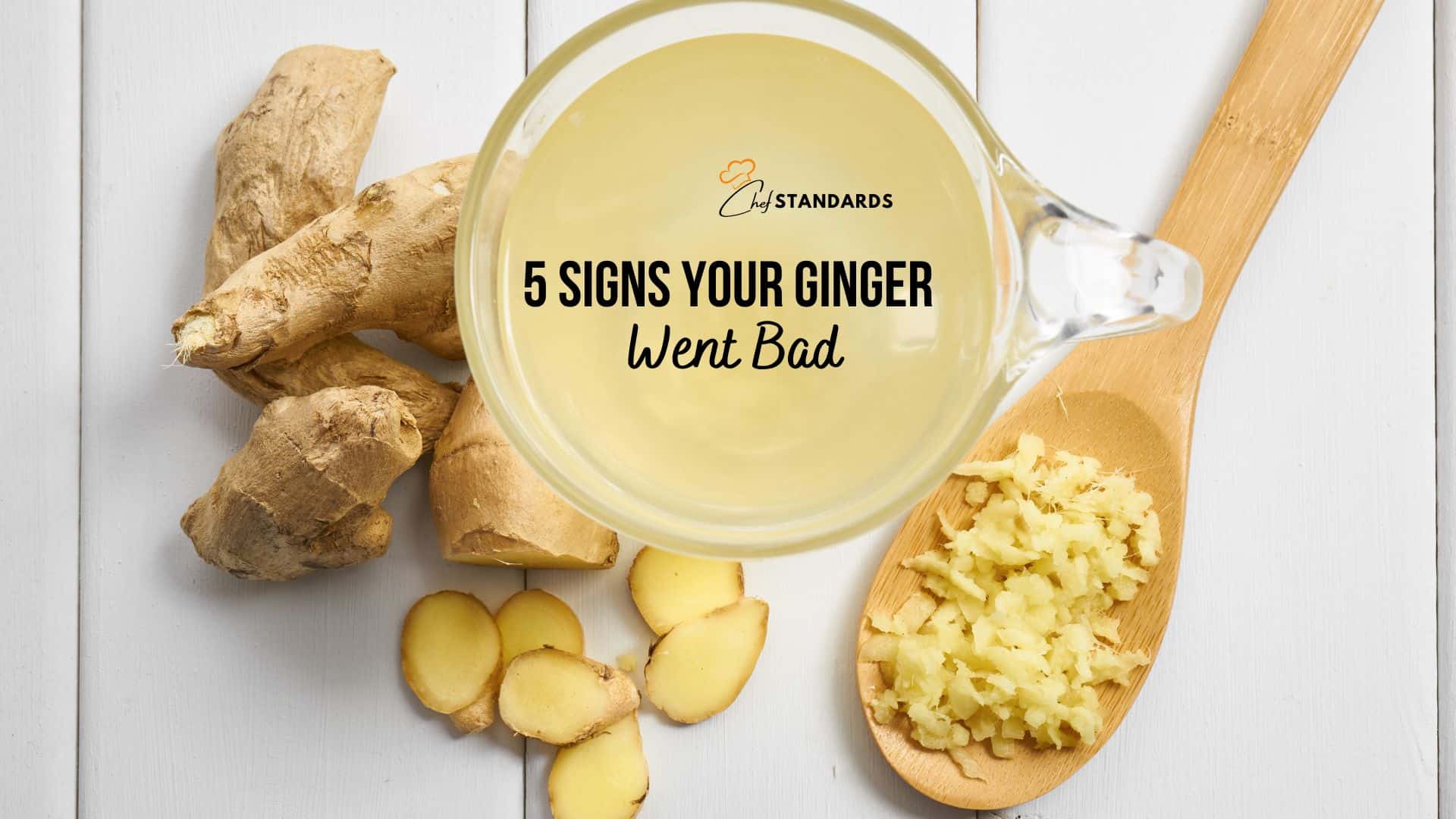Just like its cousins, turmeric and cardamom, ginger is gaining popularity very fast here in the West.
It has been used for medicinal purposes in traditional Ayurvedic and Chinese medicine for centuries.
Nowadays, except for that, people use it in many recipes and it can be found in various different forms.
Like any other product from nature, ginger can also go bad, although it has a relatively long shelf life.
But when that eventually happens, how can you tell if the ginger is bad?
Well, you will have to pay attention to a few different signs, including color, mold, texture, smell, moisture, and sprouting in order to recognize bad ginger roots.
How To Know If Ginger Root Is Bad?
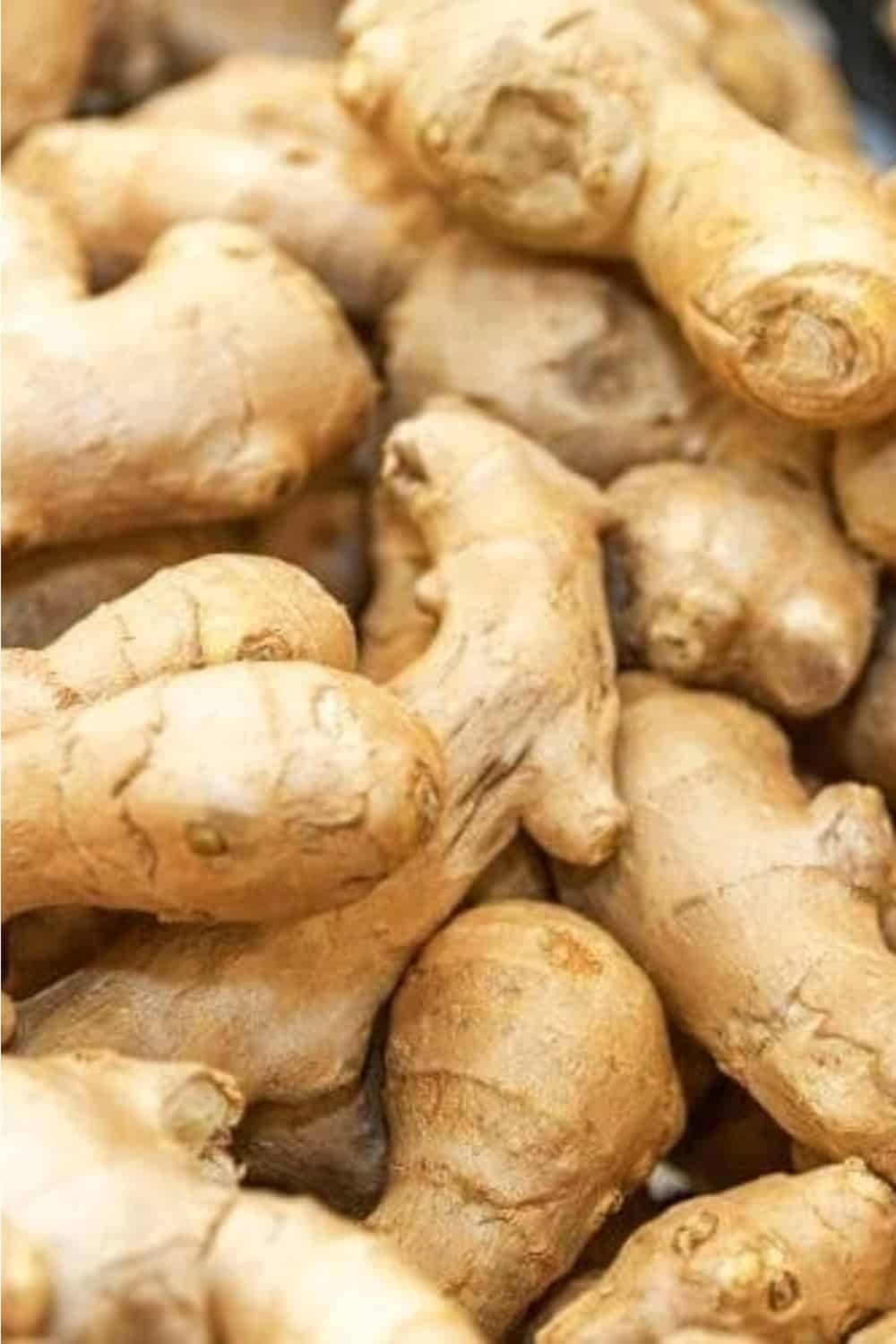
Now, there are several forms in which you can find ginger, but ginger root is the basis of every other form. So, I will start this article with the major spoilage signs of ginger root and explain each of them so that you can understand the whole picture.
1. Moldy Surface
Mold is one of the major spoilage signs of many different fruits, vegetables (other root vegetables like sweet potatoes for example), and foods in general.
Mold is actually a type of fungus that thrives under certain conditions, including high humidity, warm temperatures, and exposure to air for longer periods of time.
If mold is present in your ginger root, you will most likely see a fuzzy or powdery growth on its surface.
Its color can range from white to green or black, depending on the type of mold.
If you see any of this on the surface of your ginger, discard it immediately because it is not good for consumption.
2. Discoloration
Although discoloration can be a direct consequence of mold, there are some other types of it caused by other factors.
First, bruising of ginger can discolor the root and that can happen quite often since ginger root is quite a delicate vegetable that bruises easily.
However, bruising doesn’t necessarily make ginger unsafe to eat, but it can affect its overall quality.
Also, once ginger is cut or peeled, it is exposed to air, which can cause it to oxidize and turn brown. Once again, this doesn’t necessarily mean it is bad, but it is sometimes better to avoid it in order to stay on the safe side.
As ginger ages, it may start to lose moisture and dehydrate, causing it to discolor.
Finally, the most dangerous thing is when discoloration is caused by bacteria or contamination due to microorganisms, when ginger root may develop nasty dark spots. In that case, it is necessary to get rid of it entirely.
3. Soft And Mushy Texture
Ginger roots can become soft and mushy due to many factors. Sometimes it is not risky to consume it, but in some cases, it can be quite dangerous.
In most cases, exposure to moisture or high humidity is the main cause of soft and mushy ginger because, in that environment, ginger roots tend to break down. So, it is very important to properly dry your ginger before storage.
If your ginger root is damaged (in most cases during shipping and handling), it can develop soft spots that can lead to deteriorated quality, especially in flavor.
Finally, the most dangerous cause of soft and mushy ginger is bacterial growth, which can cause the ginger root to break down.
When that happens, ginger tends to release moisture and harmful bacteria begin to multiply rapidly.
So, if your ginger is just a little soft, you can consume it, but do so immediately. However, if it is really soft and mushy, so much so that your fingers dig into the flesh, it is best to toss it in the trash because it is most likely contaminated.
4. Bad Smell
These spoilage signs of ginger root are somewhat all connected to each other. The same goes for bad smells that can be the consequence of some other spoilage signs previously explained.
Fresh ginger has a spicy aroma, which is characteristic of most other types of similar roots. However, once it goes bad, it can emit an unpleasant odor. However, this odor can vary depending on the cause of spoilage.
First, as ginger root ages, it starts to lose moisture and flavor. It also starts to break down if it is stored for too long and that can lead to different, primarily unpleasant smells.
Aside from that, ginger root can easily absorb odors from other foods stored close to it. Although this is not necessarily a sign of spoilage, it may be unpleasant for consumption for many people.
Finally, what is most important, is the fact that ginger root can take on a bad smell if it is contaminated by harmful bacteria and other microorganisms, as well as mold.
This usually happens if it is stored in a damp or humid environment and it will probably have a musty or sour smell. In that case, it is important to get rid of it immediately because it can be very dangerous for your health.
5. Intense Bitter Taste
The flavor profile of ginger root can be described as a combination of spicy, pungent flavor with hints of bitterness.
That spicy, pungent flavor is created by certain compounds in the ginger, including gingerols, zingerones, and shogaols. (1)
On the other hand, bitterness is present in ginger due to chemical compounds known as polyphenols, which are found in the outer layer of the root.
In certain situations, polyphenols can become dominant in the root, causing the ginger to become very bitter.
The first one is when ginger ages. Too old ginger root has a more intense bitter taste because its outer skin becomes thicker and more fibrous, while the compounds that give it a pungent and spicy flavor break down, leaving only bitter-tasting compounds.
Aside from the natural aging process, the bitter taste of ginger can also be caused if the ginger has been grown with pesticides or if it has been harvested too early or too late.
Finally, improper storage, i.e. if ginger is exposed to moisture or high heat, can cause bitterness in ginger. In that case, it can also be dangerous for consumption because there is a high risk of mold. So, it is better to eliminate it if it tastes too bitter.
What If My Ginger Root Sprouts?
Sprouting is a natural process of all roots, including our ginger root. If it was the opposite, you wouldn’t be able to taste new fresh ginger roots or any other ginger produce.
But what if fresh ginger root that has been stored in your house sprouts on the surface? What can you do? Is it safe to consume it?
Well, sprouted ginger root is actually safe for consumption because it is not toxic, poisonous, or harmful in any way. That is, of course, if it doesn’t have any other signs of spoilage listed previously.
But, since it is probably older, it won’t have the same flavor and nutritional value as fresh ginger root.
So, it is up to you to decide whether you will use it or not. If not, don’t toss it in the trash because you can use those sprouts to grow new ginger.
On the other hand, if you are okay with a deteriorated flavor and nutritional value, you can use it in your kitchen. However, be sure to remove the sprouts before you add the ginger to your favorite dish.
What Happens If You Eat Ginger That Has Gone Bad?
In general, ginger is one of the healthiest roots out there, since it is full of various nutrients and beneficial compounds (like gingerol) that have strong anti-inflammatory and antioxidant effects. (2)
However, if it is not handled properly, it can spoil mainly because of harmful bacteria growth and other microorganisms.
Spoiled ginger root can cause stomach upset and food poisoning. Symptoms of stomach upset include stomach discomfort, nausea, vomiting, and diarrhea.
On the other hand, symptoms of food poisoning are stomach cramps, fever, and vomiting.
One more thing which is important to emphasize is the fact that rotten ginger tends to produce a higher amount of compound known as safrole.
According to research, safrole, if consumed in higher amounts, can cause cancer and can have a very negative effect on the liver. (3)
So, it is very important to pay attention to the signs of spoiled ginger because bad ginger can be very dangerous to your health.
How Long Before Ginger Goes Bad?
Finally, it is important to know how long you can store ginger before it goes bad. Aside from ginger root, below will be presented various forms of ginger alongside their shelf lives.
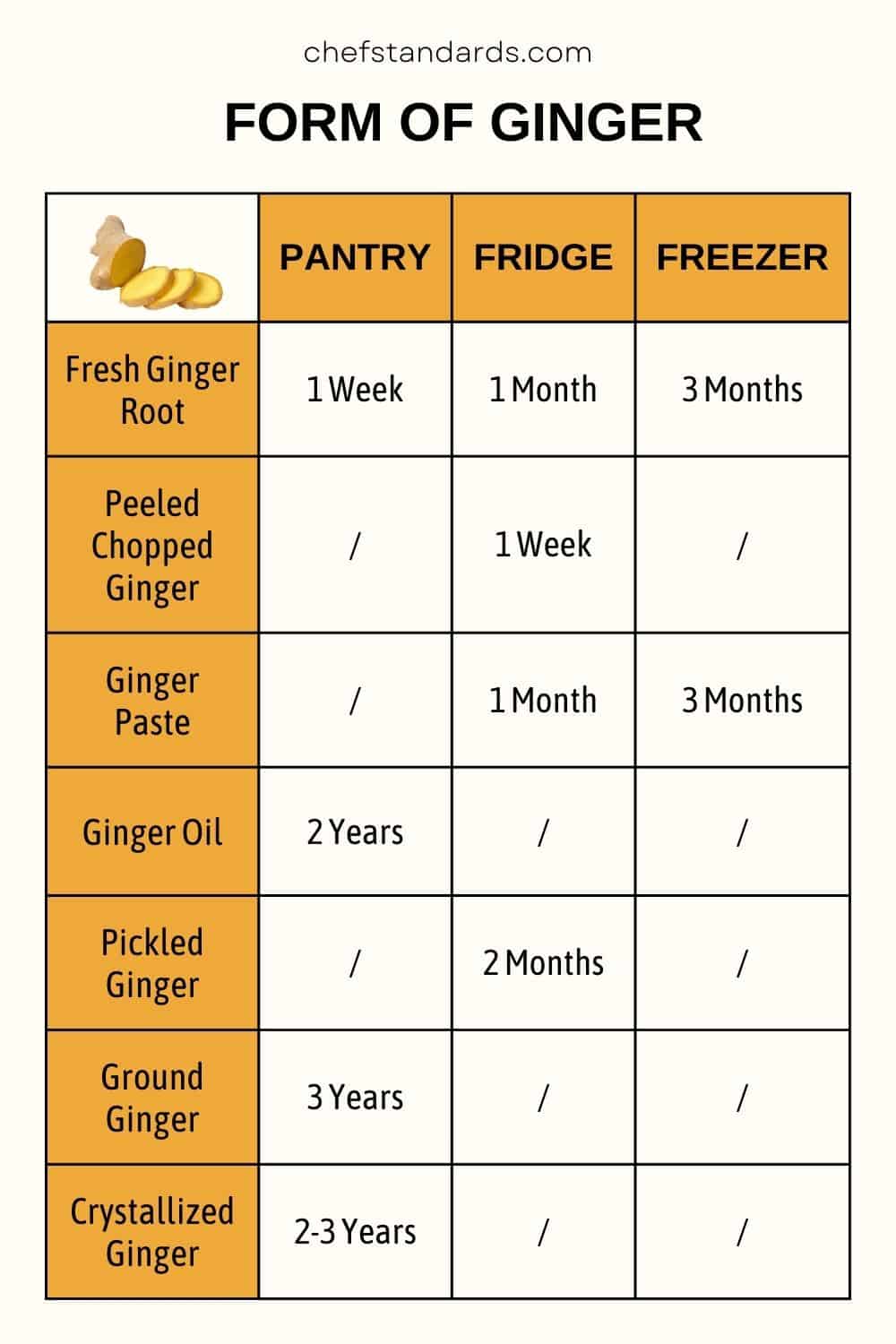
How To Use Ginger Before It Goes Bad?
Aside from storing your ginger root in a traditional way (at room temperature, in the fridge, and freezer), there are some other interesting methods to preserve the ginger and protect it from spoilage.
Make Ginger Wine
Have you ever heard about ginger wine? It is a shame if you have not because it is a light and refreshing beverage with specific spicy hints.
It can be enjoyed on its own or added to various cocktails, but you can also use it in various dishes, including curry dishes and stir-fries.
And of course, you can make ginger wine to preserve your ginger for longer. Once you make it, you can store it in a cool, dry place where it will last up to 3 months.
However, once you open it, you have to store it in the fridge because, otherwise, it will lose its flavor and aroma.
Make Ginger Paste With Salt
In order to make ginger salt, you need to ground ginger into a paste in the blender and add table salt to it, and finally stir it well.
Once it is done, all you need to do is to transfer the ginger salt to an airtight container or jar and refrigerate it. This will prevent the ginger from drying out or absorbing odors from other foods in the fridge.
Once you put your homemade ginger salt in the fridge, it will stay good for about 1 month or even longer if stored the right way.
Also, you can use ginger salt in almost any dish that requires ginger itself.
Pickle Ginger In Vinegar
Pickling some type of vegetable or root vegetable is always a great idea if you want to preserve it for longer. Aside from that, you can also use it in various ways in your kitchen and some people even find it more appealing than fresh ginger root.
The preparation process of pickled ginger is not difficult at all and you will only need a few ingredients, including peeled ginger root, vinegar, sugar, and salt.
Once you make it, you can clean the lidded jar and put the jar in the fridge. Your pickled ginger will stay good for up to 2 months.
That’s twice as much time as fresh ginger roots can last.
Can Pickled Ginger Go Bad?
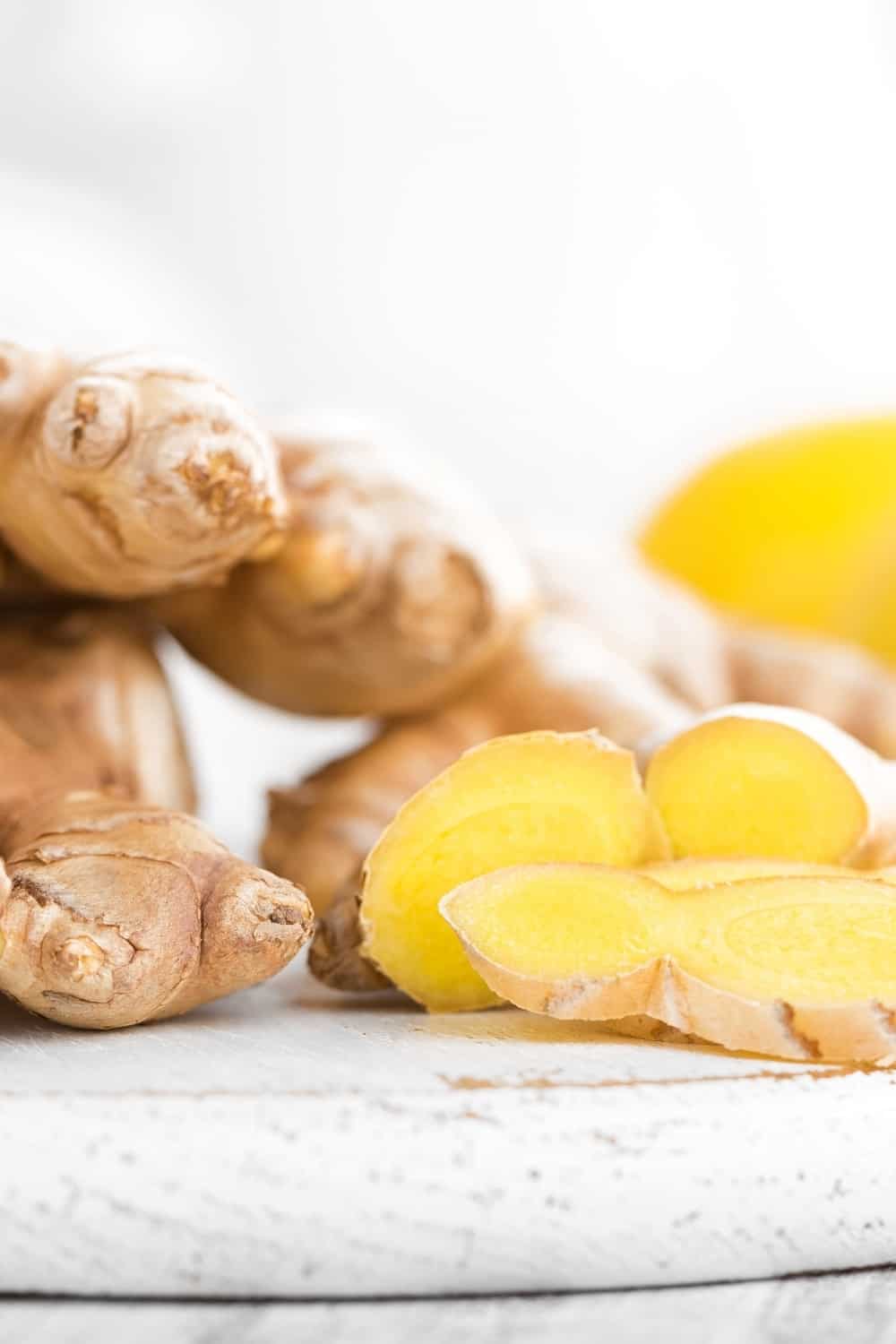
Like ginger root itself, pickled ginger can also go bad if it is not stored properly or if it is stored for too long in the fridge.
If you are not sure if your pickled ginger is still good, you should take a look at it first.If you see any brown or black spots, it may be a sign of mold or bacterial growth and you should get rid of it.
It may also smell sour or musty if it’s spoiled.
If it feels slimy or mushy under your fingers, it is definitely a sign of bacterial growth and it should be discarded.
Finally, you can taste a little bit of it and if it tastes sour or off, it may have gone bad and should not be consumed.
Does Ginger Spice Go Bad?
Ginger spice is actually a dried, powdered form of ginger root and it is used by many people in various ways. Because of that, the question of its spoilage arises.
Like many other ground spices, ground ginger also has a quite long shelf life, of course, if stored the right way.
If you store it in a cool, dark cupboard, away from direct sunlight or high heat, it will retain its freshness for as long as 3 years.
The part “will retain its freshness” is crucial when it comes to answering the question of ginger spice spoilage.
Namely, commercially packaged ground ginger actually doesn’t spoil in the traditional way, but it can start to lose potency over time, i.e. its flavor and nutritional value starts to deteriorate, but it won’t spoil in the way that it can be harmful to you.
If you are worried about the expiration date on its label, you shouldnt be because that is actually a “best-by date”, the manufacturer’s estimate of how long the ground ginger will remain at peak quality.
Since it can not go bad, there aren’t specific spoilage signs. But there is a way to tell whether ground ginger is still potent enough to be effective.
The best way to do that is to rub or crush a small amount in your hand, then taste and smell it. If the aroma is weak and the flavor is not obvious, the ginger should be replaced because it does not contain quality anymore.
Sources:
1. ScienceDirect (2017), Gingerol Overview, accessed 16 March 2023
2. Healthline (2021), Health Benefits of Ginger, accessed 16 March 2023
3. Report On Carcinogens, https://ntp.niehs.nih.gov/ntp/roc/content/profiles/safrole.pdf, accessed 16 March 2023
